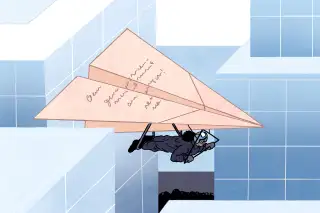Here’s How Long to Wait Before Following up After a Job Interview

Too many careers have been nipped in the bud by a “we’ll call you back.”
Much to every job seeker’s chagrin, that doesn’t always happen. Most job openings get hundreds of applicants, so even if you make it to the interview stage, it’s hard for hiring staff to prioritize updating each and every candidate.
Keeping a line of contact open with HR personnel makes them more likely to remember you when they’re narrowing down candidates. It also shows that you’re a proactive employee, and legitimately interested in the open position.
Here’s exactly how to do that.
How to phrase a followup email
The last thing a busy HR person wants to see in their inbox is a dry template email someone clearly found in a Google search.
Instead, send along “a personalized message with specific details about something that was mentioned during the interview,” says Maria Voronova, Digital HR Manager at Preply.
You can bring up something you forgot to add during the interview, or just quickly rehash (as in, two sentences max) why you think you’re the best person for the job.
Try not to be overly formal — showing there’s a real human being behind the screen will get you noticed. Writing “To whom it may concern,” probably won’t.
Be appreciative
Your follow-up message shouldn’t be clingy, but it should make it clear that you’re thankful for the company’s time, and it should definitely be sent to every single person who interviewed you.
Compliment your would-be colleagues and the work they’ve done, too. This is a rare opportunity to demonstrate how well you’d mesh with the rest of the team.
When should I follow up?
Timing is essential here. If you wait a week, or even a few days, your HR contact will have seen a bunch of other candidates in the meantime, and probably won’t remember you.
It’s a good rule of thumb to send a followup email within 24 hours, and sooner if you can. If you don’t get an answer, and the hiring manager hasn’t given you a clear time frame as to when you can expect a decision, follow up with that person again in a few days.
Coronavirus is changing how we interview
Few people could have predicted it, but in 2020, remote work has seen a huge rise. If this trend continues, in-person interviews will be a thing of the past.
This isn’t necessarily a bad thing, says Natalia Cieślak, Head of Growth at AppJobs.com, who notes that “abandoning the traditional recruitment model [makes] the process faster and more effective.”
Still, whether you’re doing an interview over a phone call, Zoom, or otherwise, you’ll still want to promptly follow up with the hiring manager. Drop them a few words of appreciation right after the call so they can remember you.
You should also connect with anyone who interviewed you on LinkedIn. Even if you don’t end up getting the job now, they can be a valuable asset for future opportunities.
More from Money
How to Turn a Job Offer at a New Company Into a Raise at Your Current Gig
Working From Home Isn’t as Cheap as You Think It Is
‘Social Media Manager’ is One of the Most Popular Jobs in the US. It's a Lot Harder than it Sounds